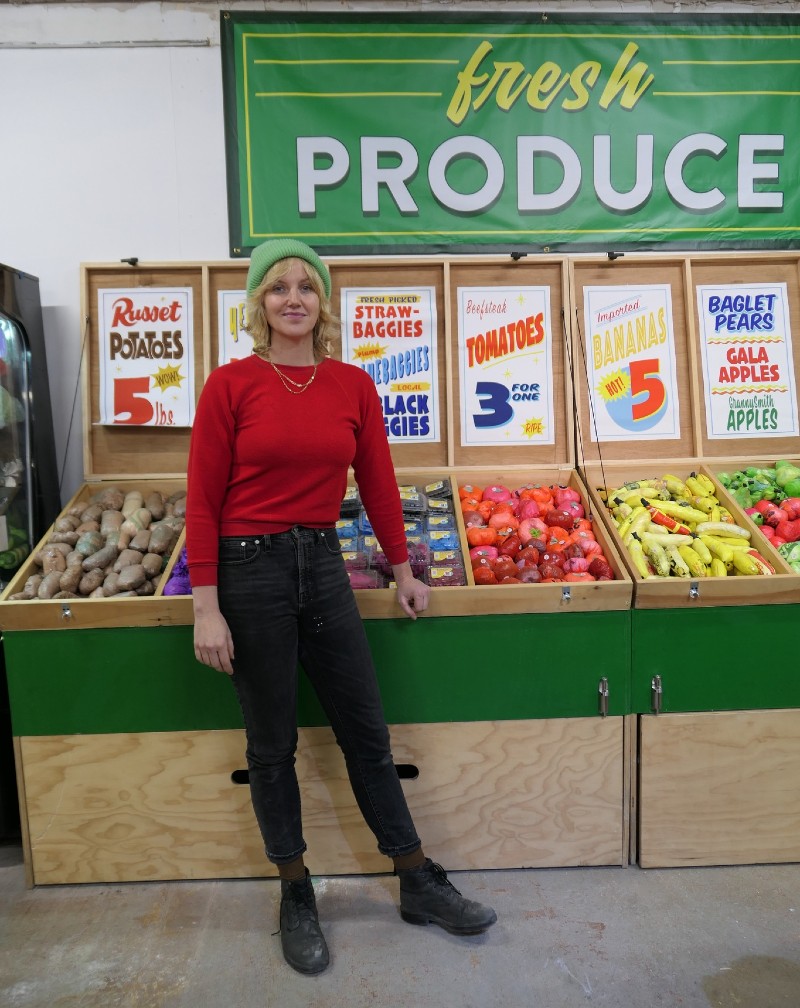“The Plastic Bag Store” Uses Art to Raise Awareness About The Pervasive Problem of Plastic Packaging

It’s an unnervingly perfect coincidence that when you emerge from the installation/play The Plastic Bag Store (TPBS) presented by University Musical Society (as part of its No Safety Net series), you see a cafeteria space with boxes of individually packaged snacks for sale on a rack.
Why? Because if there’s one thing TPBS achieves, it’s a newly heightened, re-calibrated sensitivity to the layers of packaging that surround us so constantly that we don’t even register them anymore.
In the show’s program – which is, fittingly, only available via a QR code – creator Robin Frohardt explains that the show was born in 2015, “after watching someone bag and double bag all my groceries that were already bags inside of bags inside of boxes. I wanted to highlight the absurd amount of packaging we are using and throwing away by making something even more absurd: a grocery store that only sold packaging.”
But the packaging in TPBS are fashioned to resemble typical grocery store fare: produce, seafood, bakery desserts, flowers, and salads, as well as boxes of familiar-with-a-twist items like Caps N’ Such cereal, Straws (instead of Stroh’s) ice cream, Bitz of Plastic Crap.
Attendees have time to browse the store’s extensive inventory before the show, which largely consists of short film segments shown in different areas of the installation. And my advice to you is to take full advantage of this opportunity. The level of detail (and the winky wit that drives it) is astonishing: from the back-of-the-box recipes, like “Mini Plastic Landfills” on the Bitz package; to textual product descriptions, like, on the Yucky Shards cereal box, “The ocean is full of billions of plastic shards. Sea turtles and birds eat them for breakfast. Now you can too!”
There’s even a display of “aged hard disks” in the deli display, and a magazine rack stocked with the likes of Bag Appetit and the Swimsuit Edition of Bags Illustrated (one headline: “Double Bagged? You know it”).
Humor goes a long way, of course, when it comes to activist art. No one wants to be scolded or lectured, nor do they want to feel hopeless; yet the point of a piece like TPBS is to shake us out of complacency and make us think harder about a dire problem.
That it manages to do so in funny, surprising ways is its greatest feat.
The installation takes about an hour, and the puppetry that was originally intended to be performed live within the piece (thanks, pandemic!) has instead been translated into three gorgeous, narratively related short films. The first tells the tongue-in-cheek story of an amphora figure, Thaddeus, who hatches the idea for single-use water vessel; the second follows a museum custodian named Helen home from work; and the third focuses on a future man who finds and studies various plastic artifacts from our age.
The films’ puppetry is stunning, and after the films, a brief, live-action segment (presented by Frohardt and her team) acts as a kind of coda and allows attendees to again browse the “store.” But I hesitate to go into more detail than this, since part of the pleasure of the installation is its elements of whimsy and surprise.
So I’ll close by saying that TPBS’s aim doesn’t appear to be to educate or offer solutions, but rather to power up our antennae to a pervasive problem. Yes, I began to feel frustrated while absorbing the installation’s pleasures, asking myself things like, “How could we keep food safe from contamination, and make it possible to transport and purchase, in a way that makes more sense for our planet?”
But it’s a question I hadn’t done a deep dive into before, and it’s also one that will stay with me while I consider ways I can minimize my own reliance on single-use plastic – which makes TPBS one of the more memorable, substantive “shopping” experiences I’ll ever likely have.
Jenn McKee is a former staff arts reporter for The Ann Arbor News, where she primarily covered theater and film events, and also wrote general features and occasional articles on books and music.
The Plastic Bag Store is at The 777 Building, 777 Eisenhower Parkway, Ann Arbor, through February 5. Visit theplasticbagstore.com for information and purchase tickets through ums.org.



































Comments
If you want people to see…
If you want people to see this to effect change, the price needs to be lowered.
The ticket price is definitely not geared toward those who would benefit from seeing it.
Nor can seniors on limited budgets afford it.
Sad.